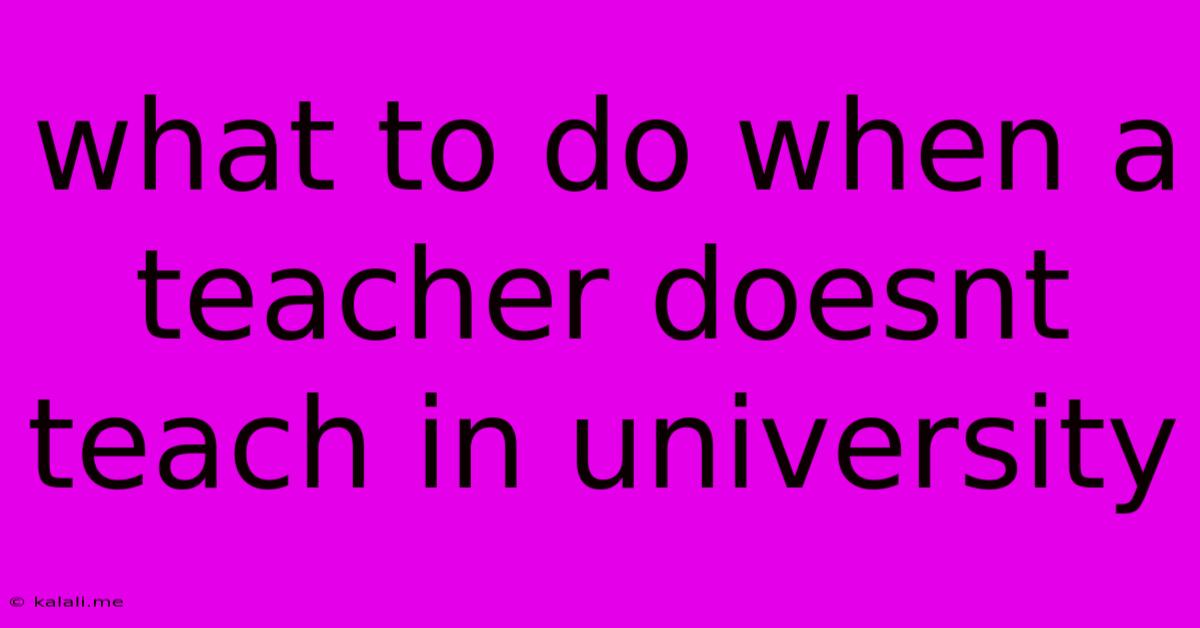What To Do When A Teacher Doesnt Teach In University
Kalali
Jun 02, 2025 · 3 min read

Table of Contents
What to Do When Your University Professor Isn't Teaching Effectively
Feeling frustrated because your university professor isn't delivering on their teaching promises? You're not alone. Many students experience this at some point during their academic journey. This article will guide you through practical steps to address the situation and maximize your learning, even when your professor falls short. Don't let a poor teaching experience derail your academic success.
Understanding the Problem: Identifying Ineffective Teaching
Before taking action, it's crucial to accurately assess the situation. Ineffective teaching manifests in various ways. Are you struggling because of:
- Poor lecture delivery: Unclear explanations, disorganized lectures, lack of engagement, or monotone delivery?
- Lack of resources: Insufficient course materials, outdated textbooks, or inaccessible online resources?
- Unresponsive professor: Difficulty contacting the professor, unanswered emails, or lack of feedback on assignments?
- Unclear expectations: Ambiguous grading rubrics, confusing assignment instructions, or inconsistent assessment methods?
- Inappropriate classroom behavior: Disrespectful conduct, bias, or lack of professionalism?
Strategies to Improve Your Learning Despite Ineffective Teaching
Once you've identified the problem, you can implement proactive strategies:
1. Leverage Available Resources:
- Office hours: Attend your professor's office hours, even if you don't have specific questions. This provides a chance to interact directly and potentially clarify points of confusion. Prepare specific questions beforehand.
- Teaching assistants (TAs): TAs are often a valuable resource. They can provide additional support, clarification, and feedback.
- Study groups: Collaborating with classmates can enhance understanding. Discussing material, explaining concepts to each other, and working through problems together can be incredibly beneficial.
- Online resources: Supplement your learning with online lectures, tutorials, articles, and textbooks. Websites like Khan Academy, Coursera, and edX offer extensive educational resources.
2. Take Ownership of Your Learning:
- Active learning: Don't passively listen during lectures. Take notes actively, ask clarifying questions, and participate in discussions.
- Self-study: Allocate extra time for independent learning. Read the assigned material carefully, review your notes regularly, and practice applying concepts through problem sets or assignments.
- Seek clarification: Don't hesitate to ask questions, either during class or through email. The more proactive you are in seeking help, the more likely you are to succeed.
3. Formal Channels for Addressing the Issue:
If the ineffective teaching significantly impacts your learning, and informal approaches haven't yielded results, consider more formal actions:
- Department chair: Contact the department chair to express your concerns. They can offer guidance and potentially mediate the situation.
- Student affairs office: Student affairs offices often have resources and processes for addressing academic concerns. They can provide support and potentially advocate on your behalf.
- Course evaluations: Provide constructive feedback on your course evaluation at the end of the semester. This feedback is crucial for improving future course offerings.
Protecting Your Academic Record:
Remember, your academic success is paramount. Document your efforts to address the ineffective teaching, including emails, meeting notes, and records of interactions with department staff. This documentation can be helpful if you need to appeal grades or seek other academic accommodations.
In Conclusion:
While encountering an ineffective professor is frustrating, it doesn't have to define your academic experience. By employing these strategies, you can take control of your learning and mitigate the negative impact. Remember to proactively seek support, communicate your concerns effectively, and prioritize your academic success.
Latest Posts
Latest Posts
-
What Does What Do You Do Mean
Jun 03, 2025
-
Are Angel Numbers In The Bible
Jun 03, 2025
-
How To Prime A Well Pump
Jun 03, 2025
-
Why Was The Sun So Bright Today
Jun 03, 2025
-
Can You Catch Giratina After Defeating It Platinum
Jun 03, 2025
Related Post
Thank you for visiting our website which covers about What To Do When A Teacher Doesnt Teach In University . We hope the information provided has been useful to you. Feel free to contact us if you have any questions or need further assistance. See you next time and don't miss to bookmark.